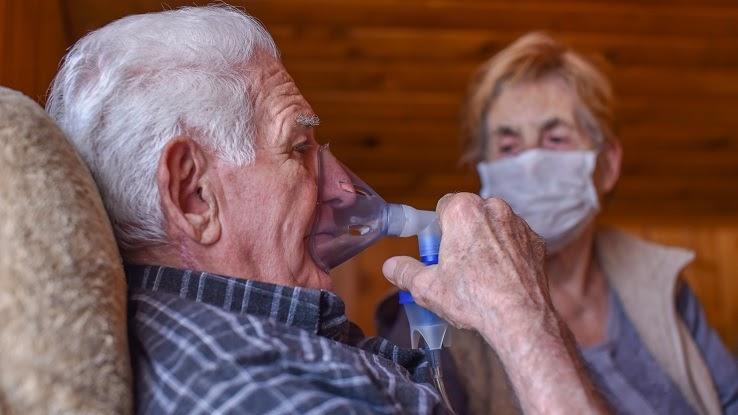
Even now, we simply don’t know how far-reaching and long-lasting the ramifications of the COVID-19 pandemic will be on anyone. However, one group, the so-called “long-haulers,” has first-hand knowledge of just how long the impacts of the virus can linger. And this isn’t a niche issue. In fact, studies suggest that between 3-10% of people who recover from COVID-19 will experience long-term symptoms.
This phenomenon is so new that there is not an official medical name for it, though, as aforementioned, many are self-describing with the term “long-haulers,” since they’ll be contending with symptoms or after effects for the foreseeable future. Additionally, this group of folks who are now chronically ill presents a unique set of challenges for an already strained healthcare system. So, how can doctors and other healthcare professionals support COVID-19 long-haulers? We’re taking a look.
What Is Long-Haul COVID-19?

People who have long-haul COVID-19 continue to experience symptoms associated with the novel coronavirus long after recovering from the disease. According to the Centers for Disease Control and Prevention (CDC), the virus is usually completely gone from an infected person’s body 20 days after their first diagnosis. Yet, some people who do not develop long-haul COVID-19 may still experience symptoms up to six weeks after recovering from the disease.
Long-haul COVID-19 occurs when symptoms last even longer than six weeks. In fact, even for long-haulers who contracted COVID-19 months to a year ago, symptoms have not stopped. While data is still being collected, there are signs that point to it being a chronic illness that patients will have to contend with. Every long-haul situation is different with individuals experiencing a variety of symptoms at varying degrees of severity. Some of the most common long-haul COVID-19 symptoms include shortness of breath, fatigue, pain, headaches, brain fog and trouble sleeping.
What Challenges Are Long-Haulers Facing?

Long-haul COVID-19 is life-altering. For most, symptoms are not mild — and they can impact the way a person’s moves through their life. For example, many long-haulers are unable to exercise without gasping for breath, while others struggle to process or recall information as quickly as they once did.
For some, lack of mental and physical stamina makes it impossible to keep the jobs they had before catching COVID-19, which is one huge area of concern for long-haulers. Between a difference in ability and needing to take time off of work, many long-haulers are facing unemployment. Without a doubt, many long-haulers need disability benefits and protections.
Unfortunately, the disability qualification process is long and difficult, with many applicants facing denial upon their first application. To meet the basic requirements for disability benefits, a person needs a diagnosis from a doctor and accompanying medical records that confirm that the applicant cannot perform certain elements of their job as a result of said diagnosis. In many cases, the disability must have been experienced by the diagnosed applicant for a full year.
Since COVID-19 and the long-term effects of it are still relatively new, a diagnosis of long-haul novel coronavirus can be difficult to procure — and very few long-haulers will have had the disease for a year already. Some cases of long-haul COVID-19 come from patients who were never tested for the novel coronavirus because their original infection was asymptomatic. In other words, when the person was contagious with COVID-19, they did not exhibit symptoms.
If long-hauler symptoms start to show, a concerned individual may request an antibody test to confirm whether or not they had a COVID-19 infection in the past. If that step is not taken soon enough, a patient may only be assumed to be suffering the long-term effects of the novel coronavirus, but doctors may be unable to back up that diagnosis with medical records.
How Can Healthcare Professionals Support Long-Haulers?

Various media outlets have already asked the Social Security Administration (SSA), which oversees disability benefits, about how it will assist long-haulers. The SSA has stated that current policies seem to be sufficient for disabled long-haulers, but the agency also expressed a willingness to create a special set of rules for COVID-19 survivors if needed.
Of course, this would still require doctors to acknowledge and diagnose long-haulers, and, while awareness is increasing, some long-haulers have been dismissed by medical professionals. With this in mind, the medical community can help these especially vulnerable patients by acknowledging that this illness, new as it may be, does exist.
Moreover, professionals on both the billing and treatment sides of healthcare are struggling to understand how to diagnose and treat this unique set of symptoms. So, what can be done to help untangle this confusion? Education efforts must be undertaken to help dispel misconceptions surrounding long-haul COVID-19. Additionally, healthcare professionals must know what symptoms to look for so that they can diagnose and assist patients. To this end, some doctors believe long-haul COVID-19 should simply be classified as a post-viral syndrome. While COVID-19 is a unique virus, classifying the long-term effects under the name of a known disease may relieve some of the internal confusion that hinders patients from getting the care they need.
Leading long-haul doctors suggest that the healthcare system provide an example for other industries when it comes to addressing the needs and concerns of long-haul COVID-19 patients. Some of the earliest cases of long-haul COVID-19 have cropped up amongst American healthcare workers, so if facilities provide their long-haulers with the support and accommodations they need, this could help create a roadmap for other industries and workforces.
The healthcare system is a perfect place to learn how to accommodate long-haulers at work because some of the earliest infections (and early cases of long-haul symptoms) in America happened among healthcare workers. Facilities are encouraged to give long-haulers the support they need when returning to work by making reasonable accommodations for them.
How Long-Haul Clinics Can Help

Around the country, clinics dedicated to helping long-haulers in particular are beginning to open up. These clinics provide mental healthcare, physical therapy, respiratory therapy, and neurological treatment to help long-haulers with the specific struggles they face. These clinics also play a vital role in compiling data about long-haul patients. Right now, most of these clinics are located in densely populated areas, such as New York City, but, as more folks begin to experience long-haul symptoms, the need for more clinics around the country may arise.
Additionally, doctors leading the fight against long-haul COVID-19 are pushing for long-haulers who never tested positive for COVID-19 to be recognized. Some were never tested because their original infection was asymptomatic — and because there was a shortage of COVID-19 test equipment. Others may have had false negatives. So, even if some patients were never officially diagnosed with COVID-19, they may still be long-haulers — and in need of support.
Without a doubt, long-haulers are facing the current reality of a disease that may only be fully understood in years to come. With new discoveries being made daily, scientists, officials, and healthcare professionals around the world are publishing ever-evolving guidance, which means remaining vigilant and well-informed can help — not just you, but those in your life you may experience long-haul COVID-19.
Resource Links:
- “Some long-haul COVID-19 patients say…” via The Washington Post
- “The tragedy of long COVID” via Harvard Health Publishing, Harvard Medical School
- Interim Guidance on Duration of Isolation and Precautions for Adults with COVID-19 via Centers for Disease Control and Prevention (CDC)
- Disability Benefits | How You Qualify via Social Security Administration (SSA)
- Supporting Healthcare Worker Recovery from the COVID-19 Pandemic via Massachusetts General Hospital





